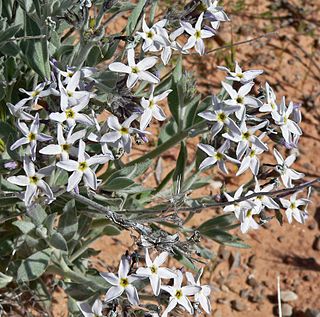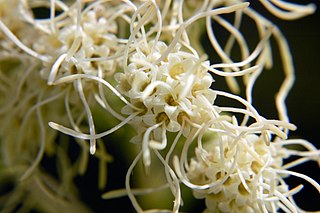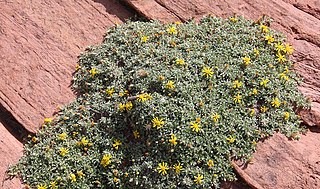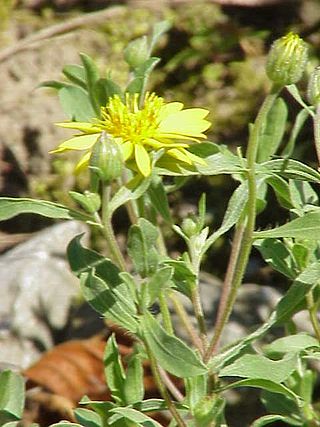
Heterotheca is a genus of North American plants in the family Asteraceae.

Amsonia tomentosa is a species of flowering plant native to the southwestern United States and northern Mexico (Chihuahua). Its common names include woolly bluestar and gray amsonia.
Heterotheca oregona is a species of flowering plant in the family Asteraceae known by the common name Oregon false goldenaster. It is native to the west coast of Canada and the United States in British Columbia, Washington, Oregon, and California as far south as Los Angeles County.

Heterotheca sessiliflora is a species of flowering plant in the family Asteraceae known by the common name sessileflower false goldenaster. It is native to California, Sonora, and Baja California.

Heterotheca shevockii is a rare species of flowering plant in the family Asteraceae known by the common names Kern Canyon false goldenaster and Shevock's goldenaster. It is endemic to California in the United States, where it is known only from Kern County. It grows along a 21-mile stretch of the Kern River.

Antennaria stenophylla is a North American species of flowering plants in the family Asteraceae known by the common name narrowleaf pussytoes. It is native to the Great Basin, Columbia Plateau, and Snake River Plain of the Western United States, in the States of Washington, Oregon, Idaho, Nevada, and Utah.

Bradburia pilosa, the soft goldenaster, is a North American species of flowering plants in the family Asteraceae, native to the south-central United States, primarily the southeastern Great Plains and lower Mississippi Valley, in the states of Texas, Oklahoma, Kansas, Missouri, Arkansas, Louisiana, Tennessee, Mississippi, and Alabama. Additional populations are reported farther east but these appear to be introductions. Its habitats include disturbed roadsides and pine-oak-juniper woods.

Brickellia eupatorioides, or false boneset, is a North American species of flowering plants in the family Asteraceae. It is widespread in Mexico from Chihuahua to Oaxaca, and in all regions of the contiguous United States except New England, New York, and the West Coast.

Heterotheca camporum, known by the common name lemonyellow false goldenaster, is a North American species of flowering plant in the family Asteraceae. It is found only in the central United States, primarily the Ozarks, the Cumberland Plateau, and the middle Mississippi Valley. There are reports of additional populations in the Northeast, the Southeast, and in the Great Lakes region, but these appear to be waifs or naturalizations.
Heterotheca barbata, the Spokane false goldenaster, is a very rare North American species of flowering plant in the family Asteraceae. It has been found only in the northwestern United States, in eastern Washington and northern Idaho.
Heterotheca fulcrata, known by the common name rockyscree false goldenaster, is a North American species of flowering plant in the family Asteraceae. It has been found in northern Mexico and in the western United States.

Heterotheca canescens, common name hoary goldenaster, is a North American species of flowering plant in the family Asteraceae. It has been found in northern Mexico and in the Great Plains of the central United States.

Heterotheca jonesii, known by the common name Jones's goldenaster, is a rare North American species of flowering plant in the family Asteraceae. It has been found in the southern part of the state of Utah in the United States.
Heterotheca marginata, the Sonora false goldenaster, is a rare North American species of flowering plant in the family Asteraceae. It grows in Arizona in the southwestern United States. It has been found in only three counties in the south-central part of the state: Maricopa, Pinal, and Gila.

Heterotheca pumila, the alpine goldenaster, is a North American species of flowering plant in the family Asteraceae. It grows in alpine and subalpine regions in the mountains of the western United States. It has been found the Rocky Mountains in Wyoming, Colorado, Utah, and New Mexico.

Heterotheca rutteri, the Huachuca goldenaster or Rutter's false goldenaster, is a rare North American species of flowering plant in the family Asteraceae. It has been found only in the Huachuca and Santa Rita Mountains of southern Arizona and northern Sonora.

Heterotheca villosa, commonly known as the hairy goldenaster, is a species of flowering plant in the family Asteraceae found in central and western North America.

Heterotheca viscida, called the cliff goldenaster, is a North American species of flowering plant in the family Asteraceae. It grows on cliffs and ledges in mountainous regions. It grows in the southwestern United States, primarily in Arizona, New Mexico and southern Texas with reports of isolated populations in Nevada, southeastern Idaho, and southeastern Colorado.

Heterotheca zionensis, the Zion goldenaster, is a North American species of flowering plant in the family Asteraceae. It grows in Utah, Arizona, New Mexico and western Texas. The plant has also reportedly been found in southeastern Idaho and northwestern Colorado, but these are most likely introductions.

Heterotheca hartmanii is a species of goldenaster that was only scientifically described and named in 2020 and commonly called the aspen goldenaster or for its association with that biome. It mostly grows in northwest Colorado with a few occurrences in southwest Wyoming. It is very similar to Heterotheca pedunculata which grows in similar environments in the desert southwest of the United States.















